小学英语语法-代词ppt课件
- 格式:ppt
- 大小:2.37 MB
- 文档页数:27

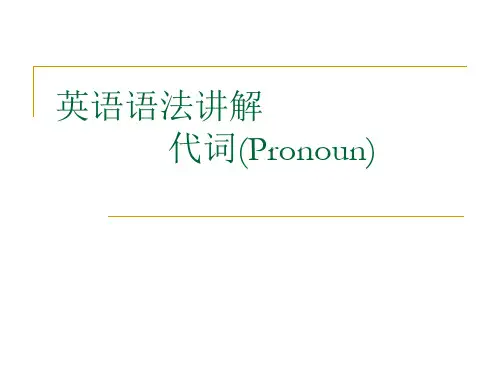
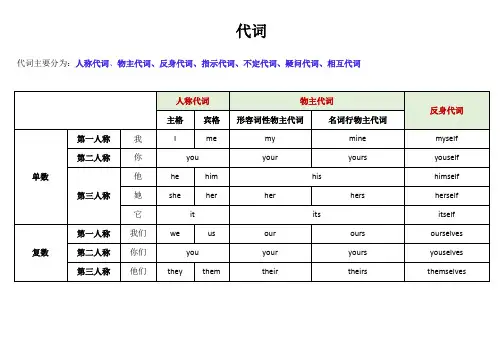
代词
代词主要分为:人称代词、物主代词、反身代词、指示代词、不定代词、疑问代词、相互代词
多个人称代词病理使用的顺序:
●单数人称代词:第二人称you>第三人称he/she/it>第一人称I
●复数人称代词:第一人称we>第二人称you>第三人称they
●形容词性物主代词后面要+名词,不可单独使用
●名词行物主代词=形容词性物主代词+名词,可单独使用
●单数反身代词词尾都有-self,复数反身代词词尾都有-selves
●第一/二人称反身代词由”形容词性物主代词+self/delves”构成,第三人称的反身代词由”宾格+self-selves”构成
疑问代词
复合不定代词
●谓语均用单数
●—one和—body用于指指代人,—thing用于指代物
●some—和any—组成的复合不定代词和some/any用法差不多
There's something interesting in thsi book
Do you want something else? 你还想要其他东西吗?
There isn’t anything on the table 桌子上什么都没有。


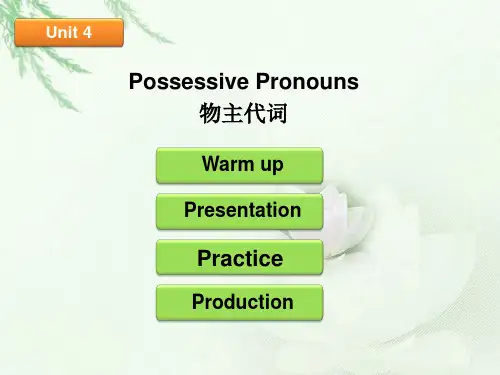
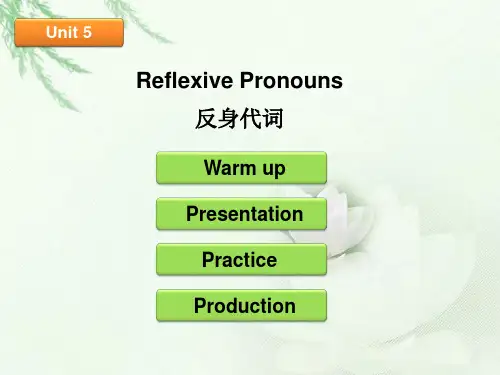
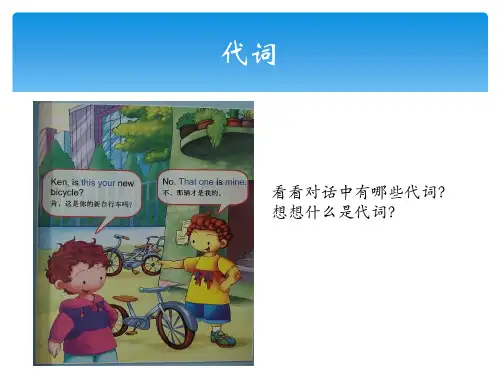



代词1、语法功能人称代词有主格宾格之分。
主格形式在句中作主语,表语等成分。
宾格形式在句中作宾语,介词宾语,同位语等成分,有时也作表语。
Who is there murmuring?谁在低声说话?It’s I /me.是我。
2、用法详解(1)we, you, they, he表示泛指,都可以指“人们”,单数用he。
(2)he,she 表示物。
Q指代宠爱的动物,通人性的动物往往用he, she。
不带有感情色彩的用it。
女主人常用she, her表示自己的爱车,宠物等;男主人常用she, her表示自己的爱车,宠物等。
Q She可以用来表示国家,船只,大地,月亮等。
Q诗歌、寓言、故事中,温柔、善良的动物(鹿、猫、熊猫、小鸟等)常用she代替,凶猛的动物(老虎、狮子、狼、狐狸等)常用he替代。
(3)人称代词用于as, than之后如果as, than看作介词,此时往往用宾格;如果是连词,用主格。
She speaks Chinese as well as me/I.(此时口语中常用me)She speaks Chinese as well as I do.(此时把as 作连词)(4)人称代词单独使用,常用宾格不用主格。
Me too.(5)几个人称并列时的顺序Q 单数场合:you + he/she + IQ复数场合:we + you + theyQ男女两性并列场合:he + sheQ承担责任时:把I (me)或we (us)放在第一位I and he are blame for the accident.Q长辈对晚辈,长官对下属说话时,如果长辈、长官是第一人称可放在前面。
I and my son went hiking yesterday.Q相当于形容词,置于名词前,作定语。
Q one's own短语表示强调,“完全属于自己”“自己的”@形出容词性物主代词构成固定短语,此时代词不可少。
Do one's homework 等关于名词性物主代词1、作用反身代词与所指的名词或代词形成互指关系,在人称、性、数上保持一致。